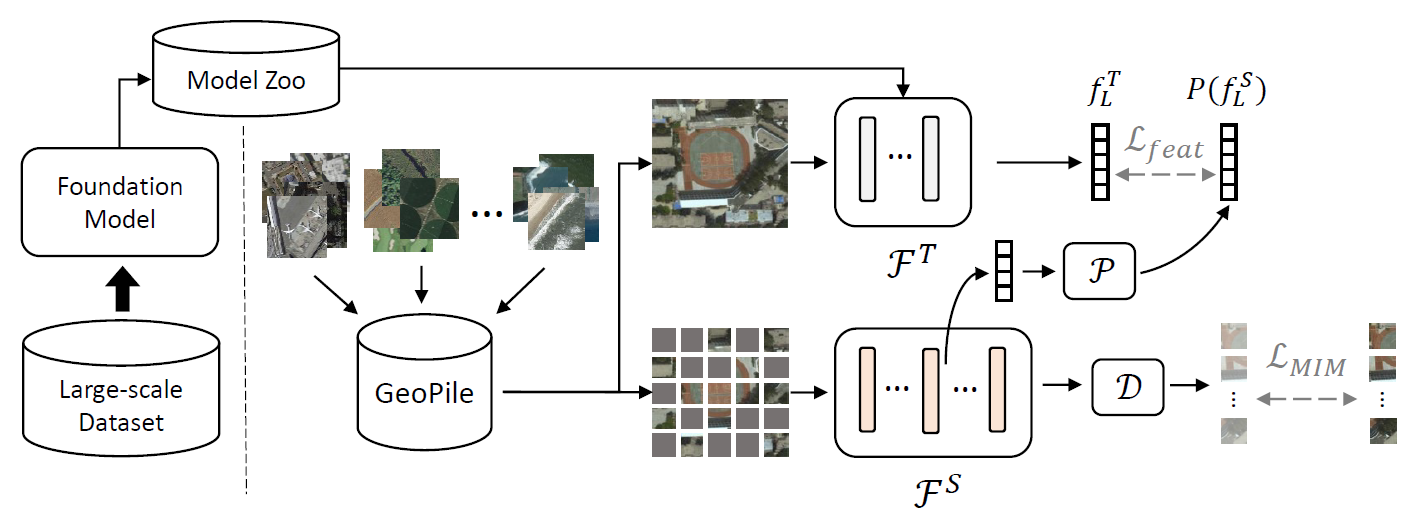Towards Geospatial Foundation Models via Continual Pretraining [arxiv]
Abstract: Geospatial technologies are becoming increasingly essential in our world for a wide range of applications, including agriculture, urban planning, and disaster response. To help improve the applicability and performance of deep learning models on these geospatial tasks, various works have begun investigating foundation models for this domain. Researchers have explored two prominent approaches for introducing such models in geospatial applications, but both have drawbacks in terms of limited performance benefit or prohibitive training cost. Therefore, in this work, we propose a novel paradigm for building highly effective geospatial foundation models with minimal resource cost and carbon impact. We first construct a compact yet diverse dataset from multiple sources to promote feature diversity, which we term GeoPile. Then, we investigate the potential of continual pretraining from large-scale ImageNet-22k models and propose a multi-objective continual pretraining paradigm, which leverages the strong representations of ImageNet while simultaneously providing the freedom to learn valuable in-domain features. Our approach outperforms previous state-of-the-art geospatial pretraining methods in an extensive evaluation on seven downstream datasets covering various tasks such as change detection, classification, multi-label classification, semantic segmentation, and super-resolution.
First follow the instructions for the SimMIM repo installation here. Then, within your newly created virtual environment, run
pip install torchgeo
pip install opencv-pythonThe GeoPile and GFM pretrained model are avaliable on OneDrive. As the GeoPile is a collection of data from various sources, please be sure to cite the original data sources (references [9, 29, 33, 35, 48] in the paper) as well if you use this in future research.
To conduct your own pretraining, first download the GeoPile dataset and unzip it on your system. Also, download the ImageNet-22k pretrained model from the SimMIM repo
wget https://github.com/SwinTransformer/storage/releases/download/v1.0.0/swin_base_patch4_window7_224_22k.pth
and place it under the following folder structure.
output
|- simmim_finetune
|- swin_base_patch4_window7_224_22k.pth
The basic command for pretraining is as follows:
python -m torch.distributed.launch --nproc_per_node 8 main_teacher.py \
--cfg configs/simmim_pretrain__swin_base__img192_window6__100ep.yaml --batch-size 128 \
--data-path /path/to/GeoPileV0/ --tag gfm --pretrained output/simmim_finetune/swin_base_patch4_window7_224_22k.pthTo perform finetuning, place the GFM pretrained model in the following folder structure.
output
|- simmim_pretrain
|- gfm.pth
An example command for finetuning is as follows:
python -m torch.distributed.launch --nproc_per_node 4 main_finetune.py --cfg configs/BEN.yaml --batch-size 128 \
--data-path /path/to/bigearthnet/ --pretrained output/simmim_pretrain/gfm.pth --tag BEN --train_frac 0.01@inproceedings{mendieta2023towards,
title={Towards Geospatial Foundation Models via Continual Pretraining},
author={Mendieta, Mat{\'\i}as and Han, Boran and Shi, Xingjian and Zhu, Yi and Chen, Chen},
booktitle={Proceedings of the IEEE/CVF International Conference on Computer Vision},
pages={16806--16816},
year={2023}
}
This code is based on SimMIM.
